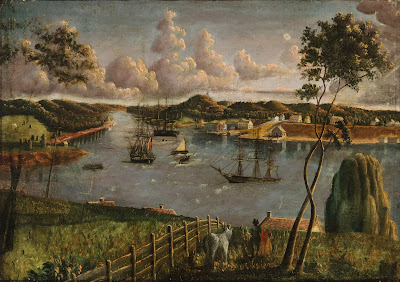The handwriting was elegant, as though written by a calligrapher. But the inscription dated January 1, 1812 was mottled, making much of it illegible. It came from a family bible1 belonging to early Marietta businessman Abner Lord. I stared at the image. What was the message and who wrote it?
As I deciphered the words, strong emotions from over 200 years ago emerged from the page. Here is an excerpt (spelling and grammar as in the original document):
Ths Jefferson…as President of the United States - proud union to a great nation of wealthy and honest inhabitants (and brought the treasury of the states into a state of bankruptcy) and myself trusting in the confidence of the nation and have become poor and declined from affluence to a state of depression - have to labour hard in order to get support for nature and all creation by that cursed policy of our government. Tho. Jefferson & Js. Madison have no doubt betrayed & sold the United States to the French Emperor Bonaparte, for their laws and policy have now almost completed the ruin & destruction of the American nation. It is impossible to lay too much against the conduct and policy of those men.
January 1, 1812
N.B. It is my request that my family should at all times and on all suitable occasions bear testimony that this cruel policy of a Jefferson, and a Madison has been our destruction as to our interest & living.
January 1, 1812 Abner Lord
Image of Abner Lord family bible inscription, courtesy of Bill Reynolds
Abner Lord was angry. His successful boatbuilding business in Marietta had been ruined by the Embargo Act of 1807. Lord and others were building ocean going vessels in a small town hundreds of miles from the ocean. How could that be? Simple: build the boats, float them down the Ohio River to the Mississippi River to the Gulf of Mexico and out to the world.
Under the Embargo Act, American ships could no longer sail into European ports. Lord’s and several other boatbuilding businesses shut down. It was a major financial setback for the local economy - and for Col. Lord.
Charles Sullivan painting depicting sailing ships in the Ohio River, viewed in New York Times article, image credited to Ohio History Connection
Abner Lord was ambitious, adventurous, and entrepreneurial - big words often associated with our pioneer settlers. He loved being part of the action, wherever that was. He moved his family in the early 1790s from Connecticut to what is now Vienna/Parkersburg WV, looking for opportunity.
But how could he make money, let alone support his family, in this still primitive settlement? Abner was shrewd; he mingled with others who had influence. With his brother-in-law Spencer he bought and sold large tracts of land in the “backlands” of Wood County. The town of Vienna was created in 1795 on 100 acres owned by the two of them.
Records show that Abner Lord was appointed as a justice of the peace (“JP”) in Wood County. The JP’s as a group decided judicial matters in the County, so he was part of the leadership structure. However, politics were rough. Abner was kicked off the panel, then reinstated. He lobbied to have the county court located in Vienna but lost out to a Parkersburg faction. Time to move on, he figured, to another community of New Englanders: Marietta.
Early Wood County WV courthouse circa 1802, from West Virginia State Archives, built in primitive setting in present day Parkersburg on property owned by John Stokely. Abner Lord had lobbied unsuccessfully to have the courthouse located on land he and Joseph Spencer owned in present day Vienna.
Abner moved to Marietta around 1800, though he had Marietta connections before that. He was owner of 1/2 share of the Ohio Company which entitled him to several plots of land. He was a charter member of the First Church of Marietta in 1796. He began a retail business at the foot of Front Street along the Ohio River.
He observed that boat building was a growing industry. Several others were making good money at it. So, he opened his own shipyard, located along the Muskingum River about where the Armory is now. Several ocean going ships were built there for him. The business was profitable; he built a nice home on lower Butler Street just west of Front Street. Life was good - until the Embargo.
Financial pressures forced him to sell the home and business at a loss. His home was sold at a sheriff sale in 1810 to satisfy the mortgage on it. His anger, resentment, and embarrassment were apparent in his bible message.
He moved to Columbus in 1811 to be nearer to his daughters. He died there in 1821. A person walking through a run down Columbus cemetery in 1872 saw this grave marker:
Sacred to the Memory of
COL. ABNER LORD
Who Departed this Life May 2, 1821
Many settlers had a positive impact on their communities, even though things did not turn out as they planned. Abner Lord was one of those.
1Thanks to Campus Martius Museum Historian Bill Reynolds for showing me this inscription.


